The Long Game
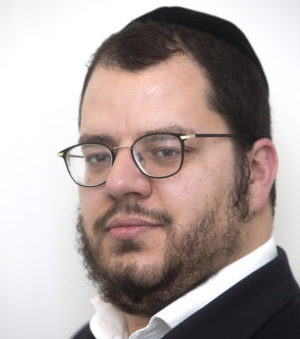
David Friedman was at the center of historic breakthroughs that benefit both America and the Holy Land he now calls home
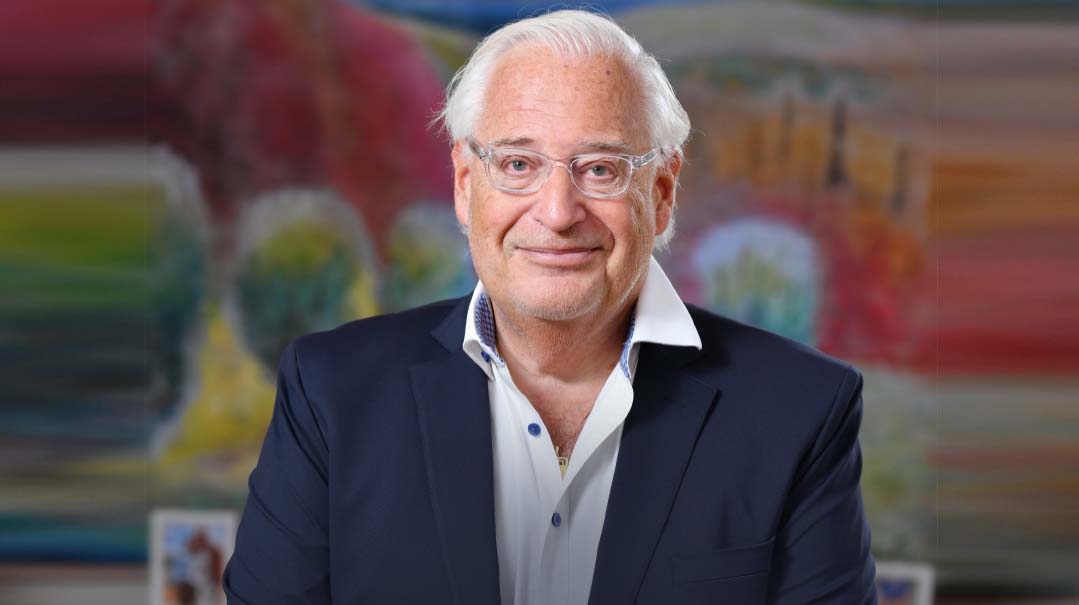
Photos: Pinchas Emanuel, AP images, Flash90
If the meaning of a man’s desk is the subject of intense psychological debate, former American ambassador to Israel David Friedman’s personal office leaves you in no doubt: it’s home to one of the most transformative personalities in recent Middle Eastern history.
Near the door to the room in his Talbiyeh home in Jerusalem is a large plaque, an exact copy of the one at the entrance to the US embassy that Friedman inaugurated in the capital of the Jewish state.
Further along is a sledgehammer in a decorative frame, which turns out to be the one he used to break into the route discovered in the Kosel Tunnels used by the Olei Regel.
But ink hardly dry, nestling in its case built into the bookshelves, is an item that encapsulates the full impact of what Donald Trump’s confidant and emissary has been part of.
In a holy city bursting with shuls housing Torah scrolls each with their own proud tale of Jewish history, the small version in Friedman’s office must surely be unique for the tale it tells.
“I think this is probably the only sefer Torah that has letters written by both gedolei Yisrael such as Rav Chaim Kanievsky, statesmen such as Binyamin Netanyahu, and leading members of the American administration such as Jared Kushner,” says Friedman, opening the case reverently. “Now and then I’ll hold a minyan here in my home, and then we use it.”
The “diplomatic sefer Torah” is perhaps the item that best encapsulates the multiple strands of Friedman’s identity and career path that converged in recent years.
A successful New York lawyer who counted the former president as a client, Friedman, 63, is an Orthodox Jew proud to be known for supporting causes that trend Orthodox and pro-Israel. But it was only in 2017 — when Trump appointed him as ambassador to Israel, despite his lack of diplomatic experience — that these strands started to come together.
Long a supporter of the Israeli right’s settlement enterprise in Judea and Samaria, Friedman not only failed to apologize to the international media for that past — he turned it into the fulcrum of his diplomacy.
“When we realized that the Palestinians weren’t ready for a deal, we said it’s time to change direction,” Friedman explains. “If Israel has such extensive ties with Arab nations under the table, and most Muslim countries need America’s backing, let’s see if we can’t bring them out into the open.”
A year after the diplomatic breakthroughs known as the Abraham Accords which were a result of that paradigm shift, David Friedman sits down to describe what that process looked like from the inside. With the passage of that year, much has changed. Donald Trump is in the political wilderness, very different administrations hold the levers of power at the helm in both Washington and Jerusalem, and the momentum of Middle East peace seems to have stalled.
David Friedman hasn’t despaired. From the private sector he’s determined to pursue the openings to the Middle East that his boss’s downfall cut short. As befits the elder statesman of Trump’s Orthodox inner circle, “Hakol bidei Shamayim, everything is in G-d’s hands” is a frequent reference in our conversation.
And if there’s one diplomatic tip that Friedman wants his successor, Biden appointee Tom Nides to take to heart, it’s the freedom of maneuver that Trump gave to Israel. “This is a 73-year-old country. After all these years, it’s definitely time to give it some independence.”
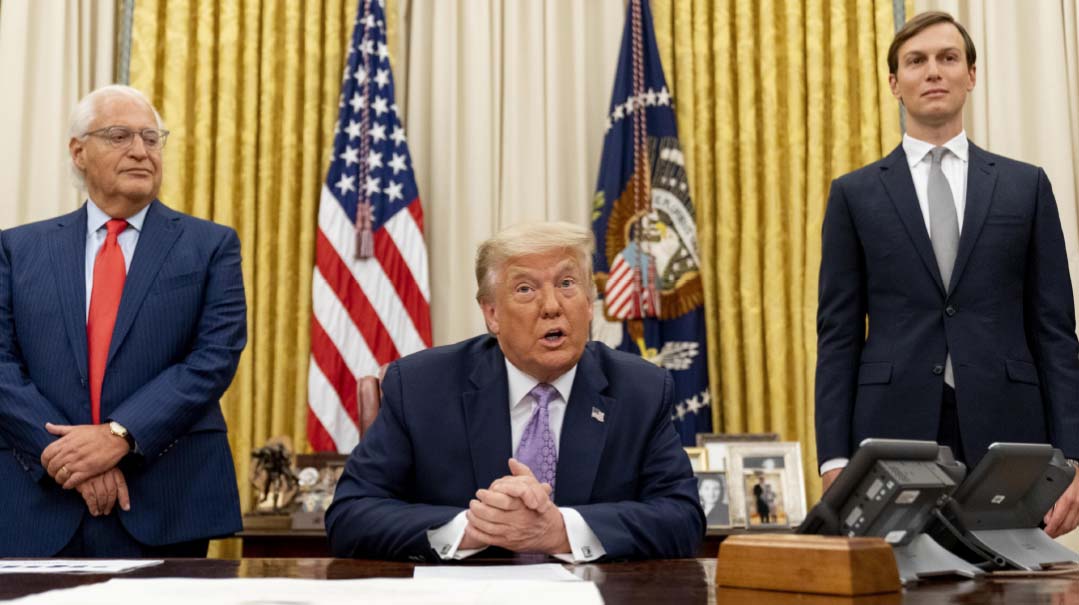
Trump Calling
There can’t be many US ambassadors with a name as culturally sensitive to their host country as David Friedman. When the future ambassador was born in 1958, his parents, Rabbi Morris and Addi, headed a community in Woodmere, New York, and named their son after Malka, Morris’s mother. The result was the unusual — though appropriate, given what was to come — Hebrew name of David Melech HaKohein Friedman.
But in the 1980s, diplomacy wasn’t yet a thing for Orthodox Jews, and so armed with a JD from NYU, Friedman headed for a legal career. It was in 2004, as head of a bankruptcy practice, that an acquaintance between Friedman and a New York tycoon blossomed. It would eventually bear immense fruit for the Jewish People.
“I had been in the legal profession for 35 years,” recalls Friedman, “and at some point in 2004, as best as I can remember, we were brought together by mutual friends. After becoming acquainted we met, and now and then I did some legal work for him.”
That reportedly involved representing the future president in bankruptcy proceedings for the Trump Casino in Atlantic City, New Jersey, but the acquaintance didn’t end there.
As with others in Trump’s Orthodox circle, it was a personal moment that sealed their friendship — Friedman points to a snowy night in Long Island.
“I was sitting shivah for my father, and the last day of the shivah, we were hit by a really bad snowstorm,” he recalls. “There was almost a meter of snow. People kept calling me to express regret for not having come earlier, because now they wouldn’t be able to make it.
“And then who shows up at my door but my client from New York, Donald Trump. It took him four hours to get there because of the storm. I was sitting in Long Island and he was in Manhattan, but he still came. I was alone then, no other visitors were there. So we sat there for over an hour discussing a variety of topics.”
It’s not clear if Israel or the Middle East was on the menu, but when Trump later appointed Friedman US ambassador to Israel, he knew very well that their thinking on the key issues was aligned. As head of the American Friends of Bet-El, a West Bank town, Friedman was a well-known supporter of Israeli right-wing causes.
The very fact that Friedman’s appointment was the first to occur under the Trump administration was a sign both of the region’s prominent place in the new president’s thinking, and his fundamental belief that the longtime formula of diplomatic balance between Israel and the Palestinians was a broken model.
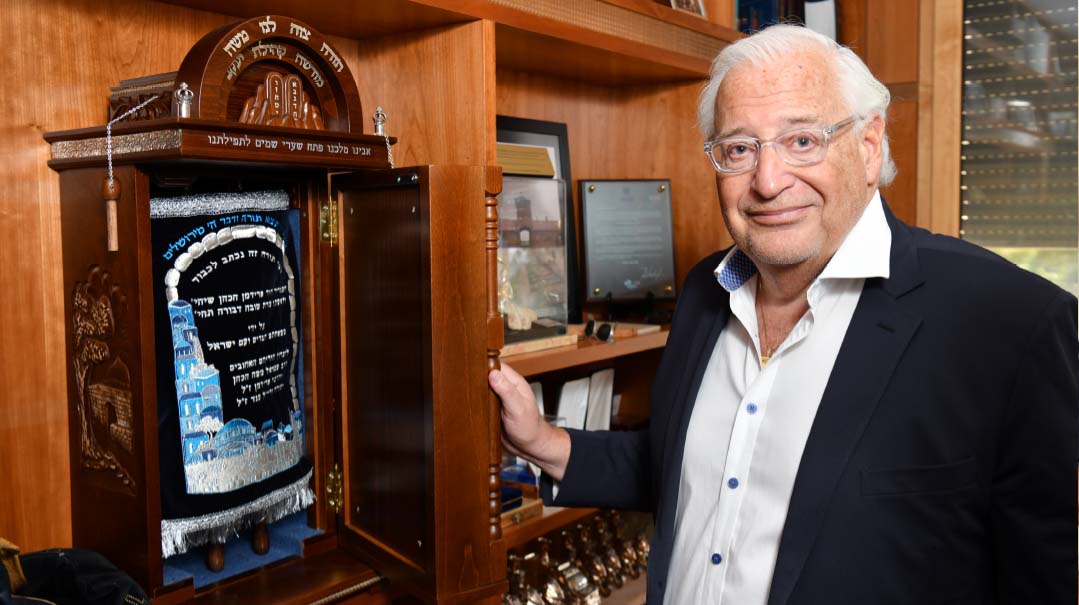
Opening to the Abraham Accords
Like a slow-cooking Middle Eastern stew, the Abraham Accords began to simmer all the way back in 2017, when Friedman was entering his post and Trump decided to visit the Middle East.
“The tour started in Saudi Arabia,” Friedman recalls. “Trump held talks with dozens of Muslim countries. He told them that extremism and violence weren’t a problem only for America. He told them, ‘You’ll have to solve this in your own countries first, and then we’ll be able to help you. Don’t expect us to wage this battle on our own.’ That was the start.”
From Saudi Arabia, Trump flew directly to Israel —the first time a direct flight from Riyadh landed in Tel Aviv. Friedman says people following Trump’s actions at that time could feel that something was brewing.
“That first flight was a signal that a historic process was beginning,” he says. “Meanwhile, we had been holding talks with then-prime minister Binyamin Netanyahu. Talks revolved around our mutual understanding that the Palestinians aren’t ready for a deal of any kind and aren’t open to any compromise. They wanted Jerusalem as well as Judea and Samaria. They had unrealistic demands, their perception of the situation was unrealistic, so there was no value to opening talks with them. There was nothing to start from.”
Friedman says Palestinian intransigence triggered a paradigm shift away from the view that Mideast peace would have to begin with a deal between Israel and the Palestinians. Trump administration officials realized that the road to peace didn’t have to run through Ramallah; it could start in the moderate Arab countries instead.
“It took years,” Friedman recalls. “But we constantly pushed the idea that it was the most natural thing, that it matched the interest of both sides. Normalization is a common interest for both Muslims and Israelis. It’s good for security, for growth, the economy, education and the future of the region. Of course, not everything good necessarily happens. A lot of effort was required, a lot of talks, but we did get there in the end.”
The result was a string of deals on a historic scale — normalization of ties with the UAE, Bahrain, Sudan, and Morocco.
But while the final results were there for all to see — Trump with Netanyahu and various Arab Gulf state leaders in the Oval Office — behind the scenes there was only a small group of officials on both sides, the better to protect against leaks.
“It was a small and select group — aside from them, no one knew anything,” reveals the former ambassador. “It was a highly sensitive issue, so we made sure that not many were in on it. On our side it was President Donald Trump, Vice President Mike Pence, Secretary of State Mike Pompeo, the president’s advisor and son-in-law Jared Kushner, myself, Avi Berkowitz, and at a certain stage also Treasury Secretary Steve Mnuchin.
“On the Israeli side, the list was even more exclusive. Prime Minister Binyamin Netanyahu, National Security Council head Meir Ben Shabbat, Mossad chief Yossi Cohen, and [Israel’s US] ambassador Ron Dermer. That was all.”
As with every momentous process, some first steps were needed to lay the groundwork. One of these was the American recognition of Jerusalem as the capital of Israel. “At first people told us we’d spark a regional war,” Friedman says. “They said recognizing Jerusalem would cause all kinds of problems. But the reality was exactly the opposite. We showed the Arab world that when we promise something to a friend, we follow through. It was a demonstration that we’re trustworthy, that you can rely on us.
“Most of the Arab world wanted assurances that even if Jerusalem were recognized as the Jewish capital, the [Temple Mount] mosques would be protected. We told them that of course no one would keep the Muslims from their holy sites, but Israel’s capital is still Jerusalem. That wasn’t up for discussion. And they respected that.”
Here Friedman shares an insight. “When it comes to the Arab world, there’s one thing that has to be borne in mind: They have a very strong sense of their history and traditions. They respect their own history, and they respect other nations’ history as well. They saw that America respected the ancient Jewish history in this land, so they said, ‘Great, they could be our friends, just as they’re friends of Israel.’ And we were more than happy to expand our ties with them.”
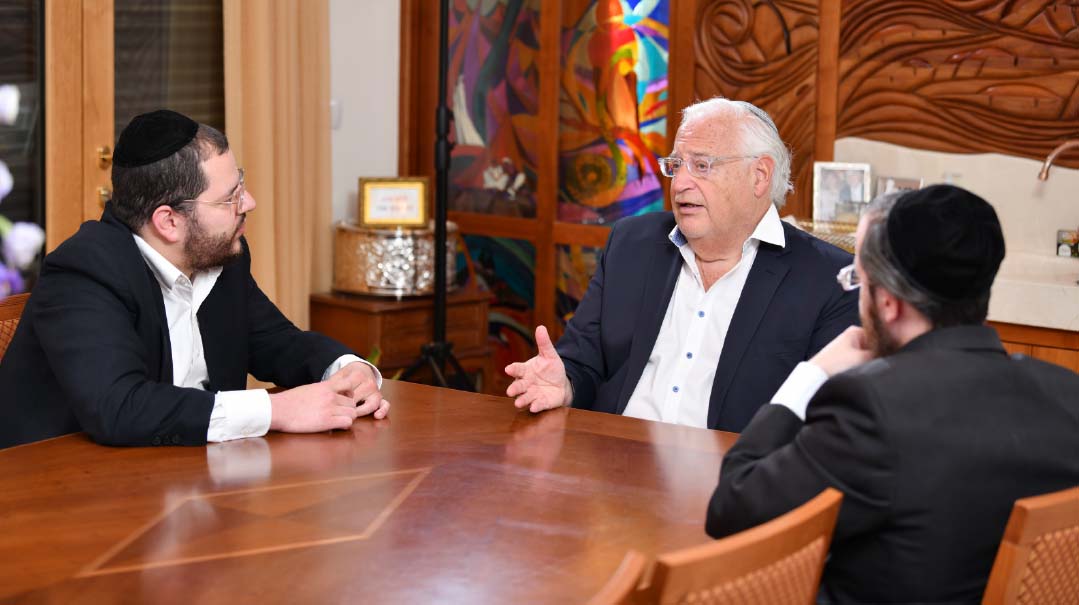
Shifting Winds of Change
Even as deals were sought elsewhere, the administration made efforts to bring the Palestinians on board. In June 2019 — more than a year before the agreements were signed with the Emirates — Jared Kushner presented the “Peace to Prosperity” plan, in essence a fleshed-out version of the economic peace that others had long advocated.
“The idea was to show that there is a way for Israel and the Palestinians to end their forever conflict,” Friedman says. “The Palestinians will get their prestige, they’ll have an economy, they’ll have infrastructure, their quality of life will be vastly improved, but they can’t be in charge of security in Judea and Samaria, because this is no game.
“The Palestinians tore it up without even reading it.”
That, says Friedman, was a tipping point for the moderate Arab states. “At this point many Arab nations said, ‘Enough. We can’t love the Palestinians more than they love themselves. We can’t be more pro-Palestinian than Mahmoud Abbas. If even he isn’t capable of considering something that could make his people happier, healthier, richer, then we can’t push it any further. We have our own interests to look after.’
“All this opened the door to the ties that were ultimately formed between Israel and the Arab states.”
The proof of the peace-process pudding, says Friedman, came just a few months ago. “Even after Operation Guardian of the Walls in Gaza over the summer, I went to visit the foreign ministers of the UAE and Bahrain, and I asked them how are things were, in light of the war. They told me the accords were 100 percent, still working.
“These are important connections, and I’m confident they’ll develop further. I believe this deal is bigger than people or governments. It’s making headway among the population on both sides.”
Just a year later, however, the same winds of change that brought the peace deals have now shifted against them.
At the time of this interview, relations between Jerusalem and Washington are tense, and both capitals have seen right-wing governments give way to the center left. Middle East watchers now grapple with America’s chaotic withdrawal from Afghanistan, its policy of appeasement toward Iran and the latter’s entrenchment throughout the Middle East, the race for a new nuclear deal, the fraying of the anti-Iranian axis between Israel and the moderate Arab nations, and a harsher tone toward Israel from the Biden administration with the planned opening of an American consulate for Palestinians in the heart of Jerusalem.
Where does all this leave the deal of the century?
David Friedman has many strong opinions, and this is one of them: The new administration will be making a “terrible mistake” if it comes into conflict with the State of Israel. As an expert on the two nations’ relations, Friedman believes that Israel provides America with no less protection than it receives in return.
“The more America reduces its presence in the Middle East, the more it must rely on the one state in the region with the willingness and ability to defend America, and that’s Israel,” he asserts. “I’ve worked with many figures in the Israeli army and intelligence services, and I can tell you that when they identify a threat to America, they respond with the same determination as if it were a threat to Israel.”
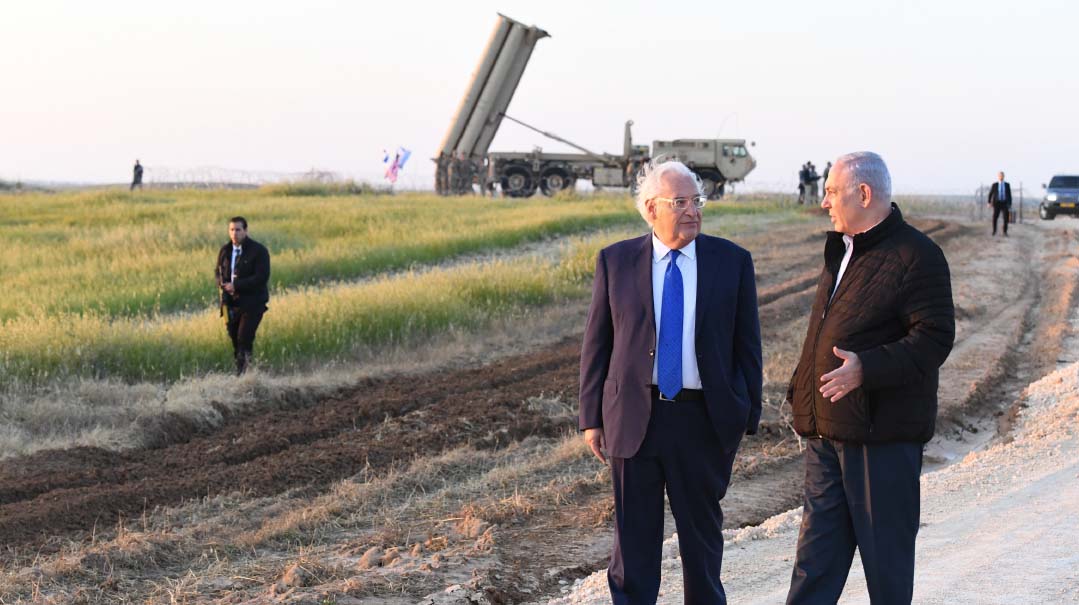
No Surprises
Biden’s administration is trying to develop trust with Israel as well — but it seems to only want that trust to run one way. Four months ago there were reports of a “no surprises” agreement between Foreign Minister Yair Lapid and Secretary of State Tony Blinken, to the effect that Israel would alert America before taking military action against Iran. Opposition leader Binyamin Netanyahu attacked Lapid at the Likud Party faction meeting for sacrificing a “sacred principle” of Israeli independence and security.
“Over my 15 years as prime minister of Israel, I was asked to make that commitment by the Americans time and again,” Netanyahu said at the time. “I invariably refused. Sometimes we gave them a heads-up about our operations, often we didn’t. But I never made a commitment to inform them ahead of time of all our operations, as this could invite pressure to call them off, or leaks to the press, which could jeopardize our most sensitive operations. We would then lose our freedom of action against Iran on existential issues.”
Netanyahu revealed that he received just such a request from the Biden White House and Defense Secretary Lloyd Austin — to which he replied that he’d take the request into consideration, but no more than that.
We ask Friedman if the Trump administration ever tried to enforce a “no surprises” policy.
“When we were in office,” he replies, “there was such an incredible level of trust between us and the Israeli government that we were never taken by surprise. We talked every day, often several times a day, so we were always well informed.
“Israel is a sovereign state and has to defend herself. If she has to act quickly with no time to spare, then she has to do what she must. If trust between the countries were restored to what it was in our time, this wouldn’t be a problem. We were true partners for regional and world security, and there were no surprises between us. We worked in such close cooperation that surprise wasn’t even possible.”
Now America’s reliability as a partner to Israel has been called into question in some quarters. The Biden administration is trying to revive the old paradigm of peace with the Palestinians being the first step. As Washington condemns the Israeli government’s authorization of construction in Judea and Samaria and Defense Minister Gantz’s labeling of Palestinian human rights organizations as terror groups, the momentum of the Abraham Accords is also fading: The Saudis are now talking with Iran. But David Friedman is quick to dismiss concerns that this is the start of a downward trend.
“I really don’t see it,” he insists. “I think there’s a strong desire to continue building off the deals we secured, to get more countries to join.”
If there is a loss in momentum, he says, the fault can’t be laid at Israel’s doorstep. “The fault is America’s. America is not standing strong against Iran. They’re begging Iran for a deal, and if you beg for something in the Middle East, that’s interpreted as a sign of weakness. The worst mistake you can make in the Middle East is to show weakness.”
The retreat from Afghanistan contributed to this perception, Friedman says. And conveying this kind of posture as Iran tries to buy time on a new deal could have unpleasant outcomes. “That does show weakness, and you can’t get a deal from a position of weakness. The Iranians are smart, they see what’s happening in Afghanistan, how we’re on the run from terrorism across the world, and it’s not good.”
But worse than cutting tail and running, says Friedman, is the impression that America is now operating without a clear blueprint. This is conveyed not only by the Kabul debacle, but by a general failure of communication.
“We have never outlined our plans for the future,” Friedman says of current efforts. “Because then the other side says, ‘Well, if you do that, here’s what we’ll do in response.’ We didn’t give them a map of how we’ll act. We leave them guessing at what options we’re considering. Now there’s a lot of talk, a lot of statements. But in the Middle East, as you know, words are nothing. Only actions matter.”
That same murkiness of intent could lead to a dangerous situation under a new nuclear deal with Iran, in Friedman’s estimation.
“I really don’t know what America will sign on to,” he says. “The previous deal was dangerous primarily because it left Iran a path to acquiring a nuclear weapon in the long run. The mechanism for international inspection was also weak. According to that deal, we couldn’t inspect military bases. Now the danger is that Iran is looking at North Korea and saying, ‘Look, they have a bomb, and it pays off.’ This is very serious. And I’m sure we won’t get any breakthrough without being very tough on them. I don’t necessarily mean that we should take military action, but they must understand that all options are on the table.”
The Old Playbook
The Biden administration seems more than willing to be tough on Israel, however, reverting to the old playbook of condemning Israel for new construction in Judea and Samaria. Friedman insists this is the wrong tack.
“Freezing construction won’t improve the situation,” he says firmly. “It won’t bring peace. It will only raise the Palestinians’ expectations to unrealistic levels. Building 300 or 400 more houses is simply irrelevant to whatever agreement we may one day come to with the Palestinians.”
So is an agreement still possible? “The answer is yes. And we’ll be able to let the Palestinians expand and allot them lands. Jews and Arabs in Judea and Samaria must learn to live together, and our focus must be on improving the quality of life for all the inhabitants of the land. Let them expand, build houses, start businesses and all that.
“I don’t know if that’s going to happen, but what’s certain is that no one there is going to leave his house. And it’s absurd to say that a growing community can’t expand in proportion to its growth. Freezing construction does absolutely nothing. I think it’s a mistake.
“Our argument is that the Jewish settlements in Judea and Samaria are not illegal. Israelis have a right to live there, as do Palestinians. People have a right to live in their own homes, and no one has a right to kick someone else out of his home. But that goes both ways.”
Friedman says the Trump administration decided it would not fight Israeli expansion in the settlements from day one. If anything, he believes such construction would in the long run prod the Palestinians toward an agreement.
“The truth is that the Palestinians will realize that the longer they wait, the less land will be left for them in the future,” he says. “Time isn’t on their side. They’re operating under the false premise that they have all the time in the world, that they can wait as long as they want and ultimately Israel will have to capitulate. They can’t operate on that premise.”
Nevertheless, Friedman cautions that Israel should not just summarily dismiss Washington’s concerns, but rather should work to rebuild a relationship of mutual respect.
“You do need to hear the other side out,” he says. “This is Israel’s most important relationship. She needs to listen to and respect the US. America’s a very important partner of Israel.
“But for all this, Israel has to explain that there are things she simply can’t accept. Israel has a sovereign government. She has her own population, her own democracy, and there are things she can’t do. The state can’t tell residents of Judea and Samaria not to be there, not to build, not to expand. You can’t say no to someone who’s building a house for his kids so they can live near him. Both [Israel and the US] need to realize this and take it into account.”
As for the settlements, the former ambassador says: “I’ve visited Judea and Samaria many times. There’s plenty of land there, plenty of open space. My sense is that there’s enough land for everyone. It’s possible for everyone to live there in peace and harmony, and there are ways to make it happen.
“I think that the only solution is simply to wait for the Palestinians to choose leaders who care about the well-being of their people, about the future of their community, about their children and grandchildren. Leaders who will let go of the hatred they inherited from their fathers. That’s what we need.
“There are a great many Palestinians who want nothing more than to be allowed to live in peace and harmony, who want prosperous businesses, good schools, like everyone else. That’s what everyone wants, and I think we can do this for them. What we can’t do for them — and I don’t think anyone can — is fulfill their desire to keep the Jewish People out of its homeland. That has to be removed from the agenda. Once it’s off the table, we can start talking…
“The problem is that the current Palestinian leadership doesn’t really care about the Palestinian people. The Palestinians leaders are very wealthy, they make a lot of money, and they get a lot more from the Arab countries, but they hoard it in Swiss bank accounts instead of funneling it to the Palestinian people. Yasser Arafat’s wife still lives in Paris, as you know.
“The Palestinians need better leadership, and the State of Israel will have to wait until it shows up. In the meantime she’ll continue developing ties with other Arab nations, and the Palestinian issue will find its solution one of these days.
“I do believe it will happen, but not in the way the Biden administration thinks it will happen. With Hamas in Gaza and Abbas in the PA, there’s not a chance. In the future, peace will come, but it will require a change in the leadership.”
—Gedalia Guttentag contributed to this report
The Work Continues
David Friedman will be remembered by history as one of Israel’s most important advocates, having helped secure US recognition of Jerusalem and the Golan Heights, transfer the US embassy to Jerusalem, and negotiate the historic Abraham Accords while standing staunchly by Israel’s side in the international arena. He looks back on that service as his finest hour.
“There’s no question that that was the point of my life, and I always say that it’s all Hashgachah pratis,” he says.
He had hopes to notch more historic accomplishments, of course. “If President Trump had received another term, the first priority would have been a peace deal between Israel and Saudi Arabia. If we had managed to get Saudi Arabia, many more states would have come around to that way of thinking.”
But although his plans were nipped in the bud, he hasn’t slowed down. Earlier this month he launched the Friedman Center for Peace Through Strength, a think tank based in Jerusalem that will try to build on the Abraham Accords and advance peace and prosperity in the Middle East.
“It might look impossible, but we’ve made a lot of progress, and I’d like to continue with that,” Friedman says of the center. “It doesn’t always have to happen through governments. It can happen through the private sector, and we have several lines of approach.”
One of the center’s first initiatives, he says, will be “taking on the lie that Israel doesn’t respect Muslim religious tradition.” This effort will take place largely in the realm of public relations.
“There have been so many arguments around the notion that Israel keeps Muslims away from the Temple Mount mosques, and everyone knows that’s just not true,” he says. “We know that many rabbanim prohibit Jews from ascending to the Temple Mount, and most people listen to them. Even those who do ascend the Temple Mount definitely don’t enter the mosques.
“And this is something the Muslim world doesn’t give Israel credit for. The Arab nations don’t realize that Israel respects Muslims, and it’s almost impossible to say this in the press, because the press is like a cult. The solution is to bring Muslims to Jerusalem and everywhere else in the country, and show them how Israel respects the Muslims, and everything it does to respect the Muslim world. I think this will greatly help to cultivate the relationship.”
This kind of targeted tourism, Friedman says, will help build bridges. “Let people come and visit, let them see and learn and get to know the State of Israel. Most of the world really doesn’t know Israel at all. What they know is what they read, and what they read is invariably unfair to Israel.”
That being said, Friedman still believes an investment in improved hasbarah will pay off. By working behind the scenes and cultivating close ties with world leaders, Friedman predicts these new hasbarah efforts will take root — especially in the fertile soil tilled by the recent peace deals.
“What’s changed is that hasbarah could become easier after the Abraham Accords. The positive outlook could come from Egypt, Abu Dhabi, Bahrain, Morocco. It could easily happen, and we have to grab the opportunity to bring as many tourists here as possible, so they can get to know it and get their own impressions without relying on the press.”
Ultimately, Friedman believes the press is what undid Trump.
“I think it was blatantly unfair to him,” he charges. “I look at it this way. If someone had fallen into a coma in 2017 for four years and woken up in 2021, what would he have seen? World peace is on the rise, the economy’s great, the military’s strong, Israel is strong, Jerusalem is the capital of Israel, the Golan is an integral part of the state, the Abraham Accords have been signed. This person would doubtless have asked: ‘Who was the president during these four years? He did a great job.’ ”
Have you spoken to Trump recently?
“I was in contact with him last spring. We were producing a documentary about the Abraham Accords and I was at his house in Palm Beach, where I sat with him for an interview lasting over an hour. I think that’s the last time I saw him personally. We’ve spoken since then several more times.”
And in your conversations with him, did you sense a determination to take back the White House in three years?
“I really don’t know. He thinks he would be a much better leader than Biden. He’s sure of it. What will he do with this thought? I don’t know, we’ll have to wait and see.”
If Trump decides not to run, who in the administration do you see as fit to continue his legacy?
“I don’t want to single out a particular man or woman, but I can say that our entire team comprised wonderful, talented people. Mike Pompeo, Nikki Haley, Mike Pence — these are all worthy people. These were wonderful, dedicated, and thoughtful people implementing the president’s policies. They were there with him, with the same vision and the same ideology.”
Before parting, we can’t help asking about Friedman’s relations with former prime minister Binyamin Netanyahu. Although Friedman respects the new government that has taken charge in Israel, his partner to the historic achievements he made was and remains Binyamin Netanyahu.
Are you still in touch with Bibi?
“We’re very good friends,” he says. “We have a connection and I greatly respect him. What I saw with him is that he’s not only a strong leader, but also a very knowledgeable person. History will judge that he did great things for the State of Israel. I think even the politicians who opposed him respect him and realize that he did a lot of good as prime minister. I don’t know anyone who thinks he did nothing good.”
(Originally featured in Mishpacha, Issue 884)
Oops! We could not locate your form.







